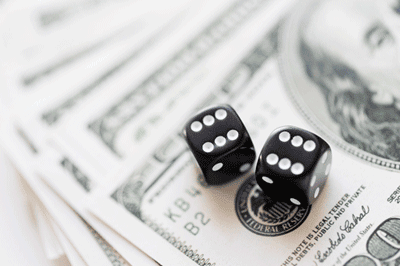Gambling addiction affects millions of people in the U.S. each year.
Although gambling addiction is more common among men, women now make up 25% of problem gamblers.
What is Gambling Addiction?
 According to the Diagnostic and Statistical Manual of Mental Disorders (DSM-5), gambling disorder is described as “persistent and recurrent problematic gambling behavior leading to clinically significant impairment or distress.” Although the term addiction is not used specifically in the definition, gambling disorder is included in the DSM-5 in the category of addiction and other related disorders. As with other addictions, the behavior tends to feel out of control and the negative consequences of engaging in the behavior increase over time. There are different types of gambling that are included in this addiction, including betting on sporting events, buying lottery tickets, playing slot machines and other casino games, and playing online poker.
According to the Diagnostic and Statistical Manual of Mental Disorders (DSM-5), gambling disorder is described as “persistent and recurrent problematic gambling behavior leading to clinically significant impairment or distress.” Although the term addiction is not used specifically in the definition, gambling disorder is included in the DSM-5 in the category of addiction and other related disorders. As with other addictions, the behavior tends to feel out of control and the negative consequences of engaging in the behavior increase over time. There are different types of gambling that are included in this addiction, including betting on sporting events, buying lottery tickets, playing slot machines and other casino games, and playing online poker.
Signs of Gambling Addiction:
- Preoccupation with gambling
- Spending increasing amounts of money when gambling
- Feeling restless/irritable when not gambling
- Lying to conceal the extent of gambling behavior
- Engaging in additional gambling in order to make up for losses
- Feeling unable to reduce or stop gambling
- Risking important social, occupational, or other opportunities in order to gamble
How Gambling Addiction Affects the Brain
Research suggests that gambling affects the brain in a similar way to that of addictive substances, such as cocaine. Gambling involves the reward system in the brain, and specifically the neurotransmitter dopamine. As with addictive substances, the reward system of the brain produces increased dopamine when somebody with a gambling addiction engages in gambling, creating the feeling of euphoria and a “high.” It is natural to continue seeking rewarding experiences, which perpetuates the gambling behavior. Additional research suggests that gambling affects the prefrontal cortex, an area of the brain that is responsible for decision making. Thus, people with a gambling addiction may have an impaired ability to realistically evaluate their losses and make sound decisions, which then leads to additional gambling.
Risks of Gambling Addiction
Some people are able to gamble in moderation, experiencing few negative consequences. For other people, however, gambling can become compulsive and can lead to a wide range of negative consequences including:
- Significant financial difficulties
- Legal issues (if engaging in illegal gambling or committing crimes in order to finance gambling)
- Relationship problems
- Feelings of shame/guilt
- Occupational problems (if missing work due to gambling)
Treatment Options for Gambling Addiction
Treatment options for gambling addiction include mutual help groups, psychotherapy, and medications. Cognitive behavioral therapy (CBT) has been found to be effective for treating gambling addiction. In this type of treatment, people are able to examine their thoughts and feelings in order to change problematic behaviors. CBT can be helpful in challenging irrational beliefs that are present in gambling addiction, such as the idea that a long string of losses signals an imminent win. Medications that have been used to treat gambling addiction include opioid antagonists, such as naltrexone. These medications work by decreasing dopamine production, thereby reducing cravings.
References
American Psychiatric Association. (2013). Diagnostic and statistical manual of mental disorders (5th ed.). Washington, DC: Author.
Dryden-Edwards, R. (n.d.). Gambling addiction (compulsive or pathological gambling). MedicineNet.com.
Gambling addiction. (n.d.). SmartRecovery.org.
Jabr, F. (2013). How the brain gets addicted to gambling. Scientific American.
Nauert, R. (2013). Gambling addiction impacts decision-making area of brain. Psych Central.

